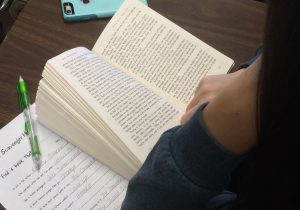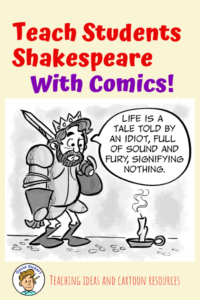
Today one of my students had a college essay that he wanted me to take a look at. I told him we could look at it during our free choice reading time.
“I don’t want to do it then,” he said. “I want to read. Can we do it later?”
Who was I to argue?
And this is what I’m finding in my classroom this year after adding free choice reading to my curriculum: my students are learning to love reading again. Papers, timed writings, and annotating have destroyed much of the love for reading that they developed when they were in elementary school. But slowly but surely, through reading books they chose themselves, they are getting they are getting interested in reading again.
I was not a big fan of this idea when it was presented to me last year. Where would the rigor be? How would we find time to do it? How do we know that we’re getting anything valuable out of it? After all, if I’m going to spend around 20% of my instructional time doing one thing, there had better be a good reason.
However, I decided to give it a try, mainly because I couldn’t shake the argument that it was better that kids read something rather than not read anything at all (which is pretty much what happened with the books they were assigned.)
I am in an unusual position in that I teach advanced senior classes. I could have used that as an excuse to not do it, claiming we needed to spend all of our time on a rigorous curriculum filled with Austen and Shakespeare and lots of essays. We couldn’t be bothered with novels that didn’t meet my standards for excellence in literature. But this even made the problem more significant for me. Here I have a classroom of high achieving, intelligent students, and reading isn’t enjoyable for them. I decided to give it a try in these classes. And the results have been eye opening.
So here’s why should you find time to do free choice reading in your high school English classes (even the advanced classes.)


1. Your students will love to read again.
There’s a good chance that your students don’t like reading anymore. They did once, but assigned reading has robbed it of the joy it once had. Independent reading gives them the opportunity to read for pleasure with no strings attached. Fostering life long readers should be one of our greatest accomplishments, for if they read for the rest of their life they are more likely to pick up the classics when they choose to.
2. It’s a terrific centering activity for the class.
I give them 10-15 minutes at the start of each class to read. This allows them to switch gears from wherever they were before my class to English mode. Furthermore, it’s one of the few times of the day where kids truly get to be still and quiet. There’s a lot of benefit to slowing the pace of the day down for them. No one gets stressed out by reading for pleasure.
3. It’s a true break from their busy lives.
My students understand the value of free choice reading. They just don’t have time for it with extracurriculars, jobs, and schoolwork. Although I tell them that if they carved out ten to fifteen minutes each day to read for pleasure at home (and some of them do) they wouldn’t miss it, many of them won’t.
Reading for pleasure gives them an opportunity to do something with no grade attached. My seniors spend so much time applying to colleges and writing application essays (on top of everything else that they do) that they look forward to having that time just for themselves.
4. You get to read too!
Free choice reading works best when you read with them. With five classes and ten minutes of reading at the start of each period, I get almost an hour of reading done each day. I’ve read more books than I ever have. And I treasure the time and really look forward to it at the start of each period.
5. It builds a community of readers.
I love talking with students about what they are reading. If it’s something they picked, there’s a good chance that they will want to talk about it. And there’s nothing quite like reading a book that the kids have already read and talking about it as you read them. I’m currently reading The Girl on the Train and a few students are waiting for me to finish it so they can talk about it.
6. They’ll read more books.
My students tell me that this year they’ve read more books in English class than they ever have. I we haven’t even read a common novel yet.
In a future post I’ll write about how I set my classroom up for success with free choice reading.




